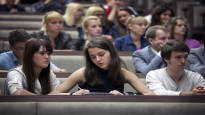“Finland and Poland received special rights as parts of the Russian Empire. They got more freedoms than the Baltic countries, which remained in the Soviet Union.”
This is what the lecturer says in the new “Fundamentals of the Russian State” course video of Russian universities. The part of the video describes the politics of the Russian Federation aiming at unity. After this, the lecturer does not mention the independence of Finland or Poland.
The incomplete and vague description of history is a startling example of Russia’s new compulsory subject, which will be introduced in all universities starting this month.
It is not a science-based lesson, but in practice the subject is Kremlin propaganda.
has become familiar with the content of the course from the Znanie website, which publishes political propaganda disguised as educational content. Some of the course’s video lectures have been published on the platform.
Researcher at the Department of History and Ethnology, University of Jyväskylä Simo Mikkonen doesn’t mince his words.
– Yes, it is quite clear political propaganda. When you look at it from a western university, it’s rough, he says.
We extract statements from the subject that try to influence the students’ world view.
Here are five striking examples of the course content:
The purpose is to boost Putin’s power
Russia has started a new history lesson that has been changed to suit the Kremlin at all school levels. A new history book was also introduced in elementary schools in the fall.
According to the researchers, the purpose of everything is to get the Kremlin’s and Putin’s world of thought through.
– This is more systematic than it sounds, says the Program Director of the Institute for Foreign Policy Arkady Moshes.
According to Moshes, Putin must rewrite history to serve his power.
According to researchers, Russia’s new subject is not based on science. Moshes emphasizes that the new subject also does not mean that the Russian leadership is now creating some kind of new ideology of Putinism.
– Of course, Putin’s personality and way of thinking have an effect, but Putin is not a theoretician or a philosopher. He wants to shape the nation, but he is not a thinker, says Arkady Moshes.
Russian universities have been silenced
asked a few Russian universities how they plan to adopt the “new political theory”.
A spokesperson for St. Petersburg’s European University tells via email that the new course is not included in the study program because it is a private university.
The State Moscow School of Economics (HSE) states that the educational institution does not want to comment on the matter.
– Freer universities like the Moscow School of Economics have been destroyed and silenced a long time ago. The teachers who remain either share the Kremlin’s views or adapt to them as they did during the Soviet era, says Moshes.
The “new political theory” is also a way to get rid of overly liberal teachers, Mikkonen points out.
– If it is at all critical, it can be shown that it has acted in violation of the law. Someone more suitable will be brought in to replace him, says Mikkonen.
The course has a total of 72 hours of teaching. Researchers don’t think it affects all students.
Moshes, who once studied in the Soviet Union, compares the present moment to his own years of study.
– I don’t think this will work. It didn’t work in my generation and it won’t work in the new, significantly freer generation, says Moshes.
According to him, people today are individualists, also in Russia.
– Especially the younger generation does not buy the idea that a person is just a part of a big machine.
Humor and satire flourished in the Soviet Union. They were means of opposing the prevailing order.
According to Moshes, it is possible that the new political doctrine will also become a joke.
According to researcher Mikkonen, the new doctrine can still be effective in rural university towns.
– For example, the younger population in more remote regions has not traveled as much as the more international young people in Moscow and St. Petersburg. This way they can be more susceptible to the Kremlin’s message, Mikkonen estimates.
This is how the video presents the basic pillars of the Russian worldview
According to Mikkonen, the situation is difficult because ideological and political control is tightening.
He reminds us that there are other authoritarian states in the world that engage in similar ideological education. China is one of them.
– If you compare to the Soviet era, then the teaching of Marxism-Leninism was mandatory and ideological education was part of university studies. This is a step into that world, says Mikkonen.
The video shows, for example, how tanks rumble through the streets of central Moscow in 1991. The lecturer’s a voice warns about how it will be if you take a model from the administrations of other countries: the collapse of the Soviet Union is presented as a warning example.
“It is dangerous to take cues from other countries. Russia is a special integration empire. It is in the nature of our country to improve and develop the regions it connects,” the course lecturer teaches.
Researchers are particularly concerned about the new generation, which is now being brainwashed into a conservative and nationalist worldview.
– Young people spend a large part of their lives in a propaganda bubble, where claims about the decadence of Western countries are repeated and Russia is presented as the happiness of the future, says Mikkonen.
According to Mikkonen, when repeated enough, propaganda begins to numb even a critical person.
